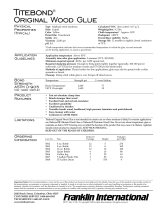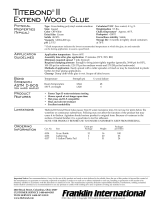Page is loading ...

The Crackling Process
The Crackling Process
Titebond Liquid Hide Glue can be used to achieve "crackling". This process can give an antique appearance to
furniture as well as many other items. With this effect, virtually any item will appear distinguishably aged. When
a dried coating of Titebond Liquid Hide Glue is painted with a latex paint, the Hide Glue absorbs much of the
water from the paint. As the surface of the paint is drying, the Hide Glue is swelling or stretching from this
additional moisture. The swelling of the Hide Glue effectively "pulls apart" the top coat of paint. As a result, the
crackle effect is achieved.
Instructions
1. Crackling will work on virtually any surface. The most successful working material is wood. However, the
crackling process will occur with metal, glass, rubber and plastic. (Some surfaces may require a sealer.)
2. Choose two colors of latex paint. Water-based paint must be used. One color should be lighter than the other
color. Choose one color as the base coat. The topcoat will be the predominant color of the finished piece.
3. Coat the piece with the first color and allow to thoroughly dry. This will be the color that shows through the
cracks.
4. Apply an even generous coat of the Titebond Liquid Hide Glue. Make sure that the piece is covered
completely. Allow the piece to dry thoroughly. The drying process may take up to 12 hours. The drying time will
vary according to your humidity condition.
5. After the Titebond Liquid Hide Glue is dry, apply the second color of water-based paint. Do not overlap your
brush strokes. The crackle effect may not occur in the overlapped areas. The effect should be immediate.
6. Allow the paint to dry.
7. Apply a NON-waterbased, waterproof sealer.
General tips
● The Titebond Liquid Hide Glue may be thinned with water. We don't recommend thinning the glue any more
than 50% by weight or by volume. The more that the glue is thinned, the smaller the cracks will be on your
finished piece.
● The glue has a hard time sticking to a gloss or a semi-gloss base coat. You can sand the surface to get better
glue adhesion.
● It is a good idea to do a practice with all your supplies before you begin on your actual piece.
file:///C|/Documents%20and%20Settings/donm/Desktop/The%20Crackling%20Process.htm (1 of 2)3/24/2006 7:22:03 AM

The Crackling Process
● Remember that two square feet can be covered with one fluid ounce of the Titebond Liquid Hide Glue.
● Don't be afraid to be creative! Have fun!
For further information on the crackling process or the Titebond Liquid Hide Glue contact a Franklin
International technical service representative at 1-800-347-GLUE(4583).
file:///C|/Documents%20and%20Settings/donm/Desktop/The%20Crackling%20Process.htm (2 of 2)3/24/2006 7:22:03 AM
/












